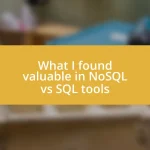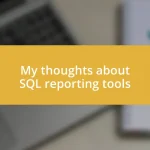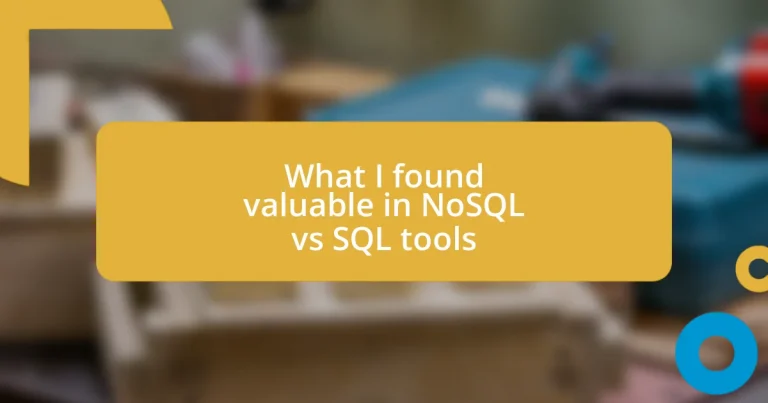Key takeaways:
- SQL excels in structured data handling, ensuring data integrity, consistency, and complex querying, making it ideal for transactional systems.
- NoSQL offers flexibility for unstructured data and real-time analytics, allowing for rapid scaling and adaptation to changing project requirements.
- Choosing the right database depends on anticipated growth, data characteristics, and user needs, highlighting the importance of aligning database strategy with project goals.
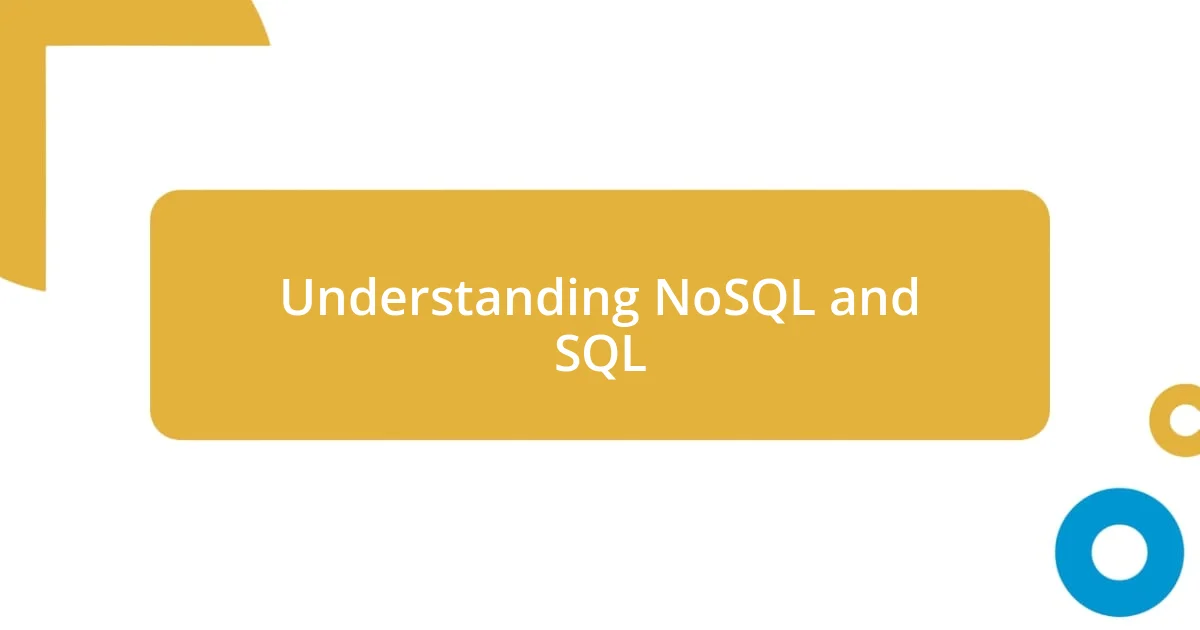
Understanding NoSQL and SQL
In my journey through database technologies, I’ve found that SQL (Structured Query Language) is like a well-organized library. It’s great for maintaining order with its tables and relationships, ideal for applications that require a structured approach. Doesn’t it feel reassuring to know that you can query a vast amount of data using a precise and uniform command language?
On the other hand, diving into NoSQL felt like stepping into a vibrant, art-filled space where creativity thrives. NoSQL databases break free from the rigid structure of tables, opting for documents or key-value pairs that can change as needs evolve. Have you ever experienced a project where flexibility was crucial? That’s where NoSQL shines, allowing rapid iterations without the constraints of a predefined schema.
What struck me most is the idea of scalability. With SQL, I often felt close to my limits when handling massive amounts of data. In contrast, NoSQL seemed almost limitless; it effortlessly handled growth like a balloon expanding in the sky. Isn’t it fascinating how different approaches cater to distinct needs, shaping the way we conceptualize and manage data?
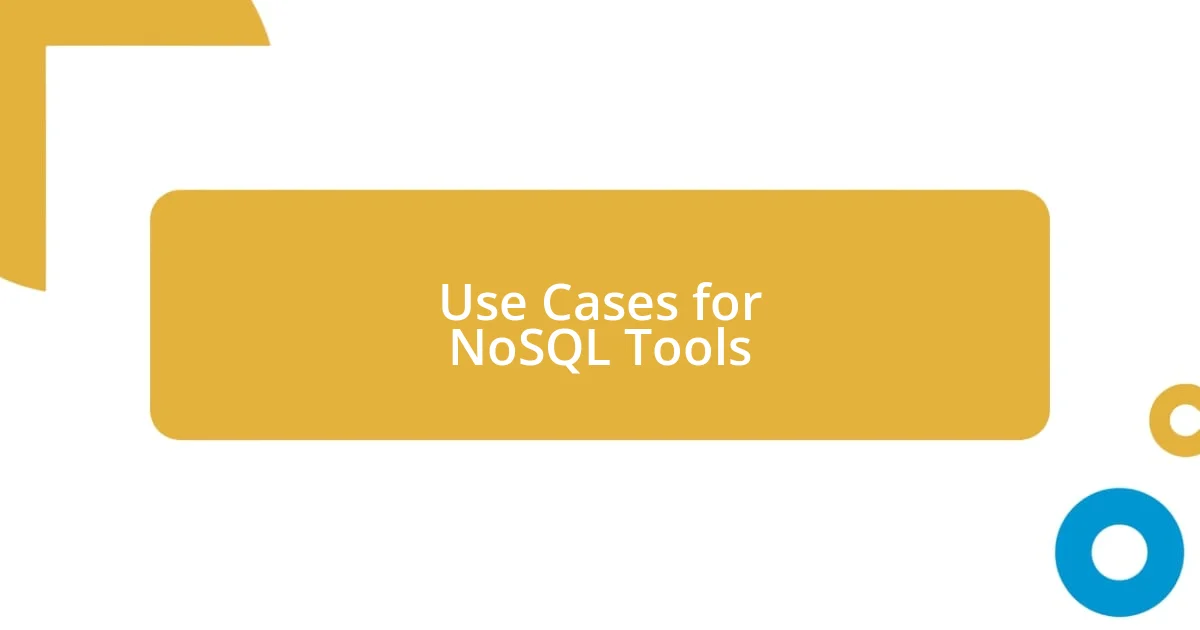
Use Cases for NoSQL Tools
When I first began working with NoSQL databases, I was amazed by how seamless it was to accommodate unstructured data. A vivid memory comes to mind of a project where we had to analyze large volumes of social media content, which varied in format—text, images, and interactions. The flexibility of NoSQL allowed us to store all that diverse data without worrying about fitting it into a predefined mold. It felt liberating to adapt our data structure on-the-fly as new requirements emerged.
Another fantastic use case I’ve come across is real-time analytics. In one of my previous roles, we were tasked with tracking user interactions on a web application. Using a NoSQL database, we could ingest and analyze data in real-time, providing insights that directly influenced user experience. I remember the rush of excitement as our team implemented changes almost instantly, thanks to the rapid iteration enabled by NoSQL. It’s incredible how tools that support flexible schemas empower teams to innovate quickly and maintain a competitive edge.
Scaling applications is another significant advantage of NoSQL. I recall a scenario where a product launch led to a sudden spike in user activity, which could have overwhelmed a traditional SQL database. However, with NoSQL, our application managed the increased load effortlessly. I learned firsthand the importance of choosing the right database technology, as the ability to scale horizontally and accommodate heavy traffic without compromising performance was invaluable.
| Use Case | Description |
|---|---|
| Unstructured Data Storage | Ideal for projects with diverse data formats, enabling flexible schema adjustments. |
| Real-Time Analytics | Supports immediate data ingestion and analysis, facilitating rapid decision-making. |
| Scalability | Allows seamless scaling to handle sudden increases in user activity without performance issues. |
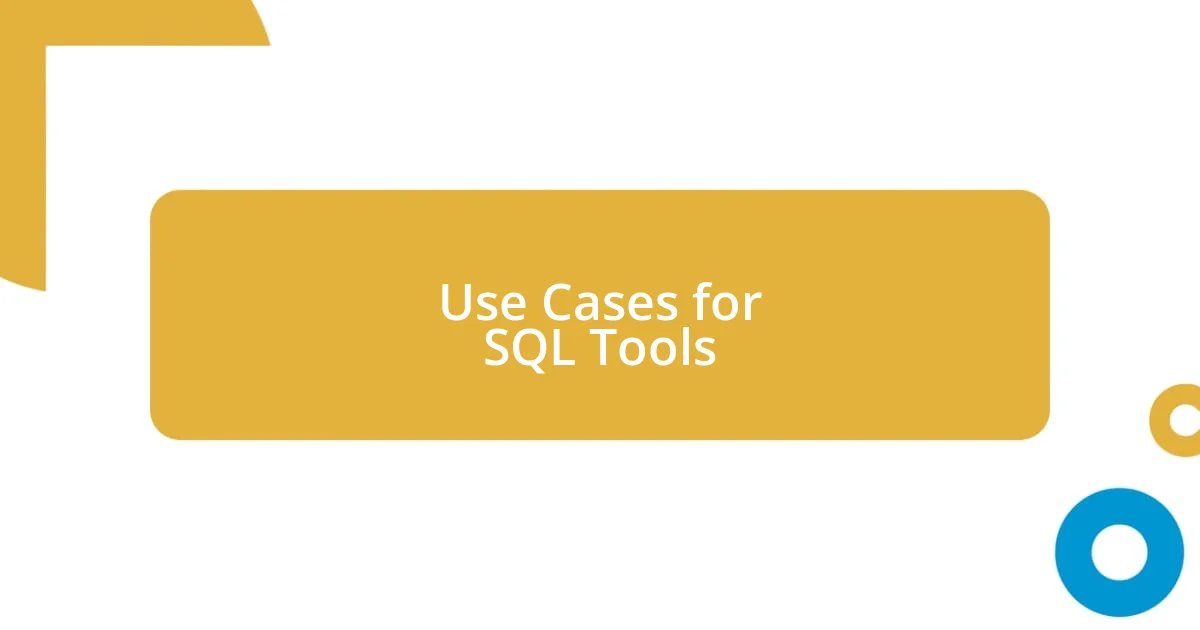
Use Cases for SQL Tools
When considering use cases for SQL tools, I can’t help but recall the times I delved into structured data requirements for various projects. For instance, I once worked on a financial application where the integrity and consistency of data were paramount. Utilizing SQL databases allowed us to enforce stringent rules through relational integrity, ensuring that every transaction was accurate and traceable. It felt reassuring to trust the database’s structured query capabilities, especially when our reporting relied on precise calculations and relationships between datasets.
SQL tools shine in the following scenarios:
- Transactional Systems: Best suited for applications requiring reliable transactions, such as banking and inventory management.
- Complex Querying: Useful for running complex queries and joins across multiple tables, which is crucial for detailed reporting.
- Data Consistency and Integrity: Ideal when maintaining strict data integrity and consistency is a business priority, as SQL excels in relational data management.
In my experience, the emotional satisfaction of resolving complex queries and displaying data accurately is hard to beat, particularly in demanding business environments where data-driven decisions can make all the difference.
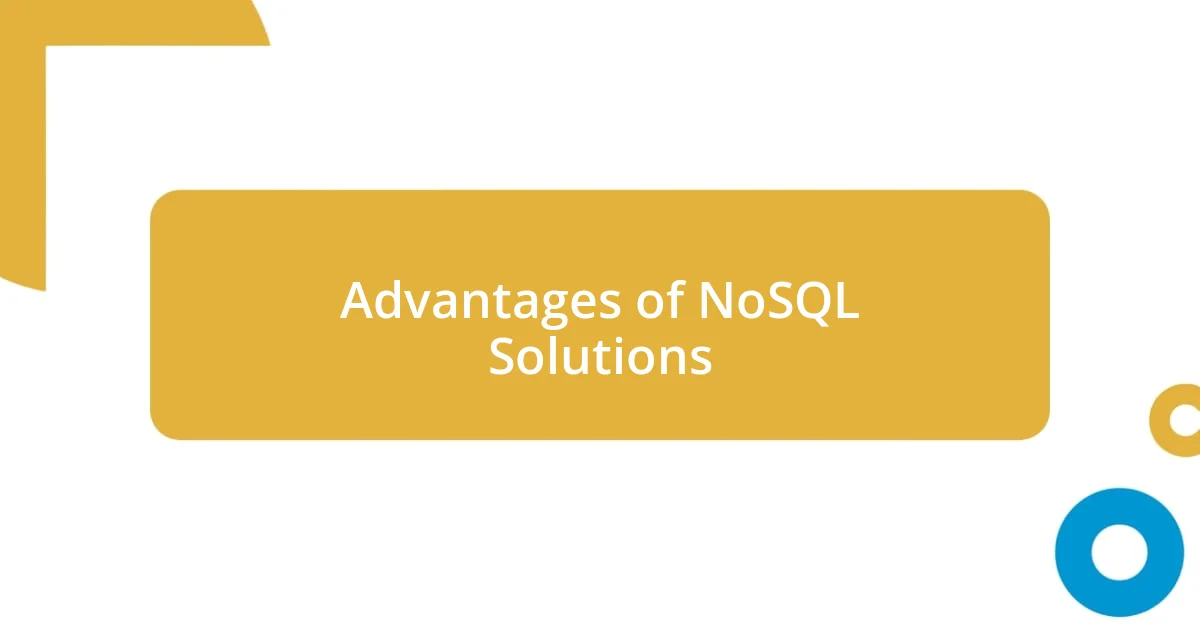
Advantages of NoSQL Solutions
The flexibility of NoSQL databases has genuinely transformed how I approach data management. I still remember a time when a client needed to pivot their entire business strategy mid-project. Thanks to NoSQL’s schema-less design, we could incorporate new data types without the usual migration pains typical of traditional SQL databases. This adaptability not only saved us time but also encouraged innovative thought within the team, as we were less shackled by rigid frameworks.
One of the aspects I find particularly compelling is how NoSQL shines in big data scenarios. Imagine analyzing petabytes of data from connected devices! During a hackathon, I worked on a real-time dashboard that pulled metadata from IoT devices. The performance was remarkable—our system effortlessly scaled to process a surge of information. I felt an exhilarating mix of excitement and relief knowing that our choice of NoSQL was making such a powerful impact.
Lastly, the ability to distribute data across multiple servers cannot be overstated. When I collaborated on a global e-commerce platform, the requirement for low latency around the world was crucial. NoSQL databases enabled us to replicate data across regions seamlessly, which kept the user experience smooth and responsive. Have you ever experienced a website lagging and felt frustrated? With NoSQL, I could avoid that feeling for countless users, which reinforced my belief in the immense value of choosing the right database strategy for international reach.
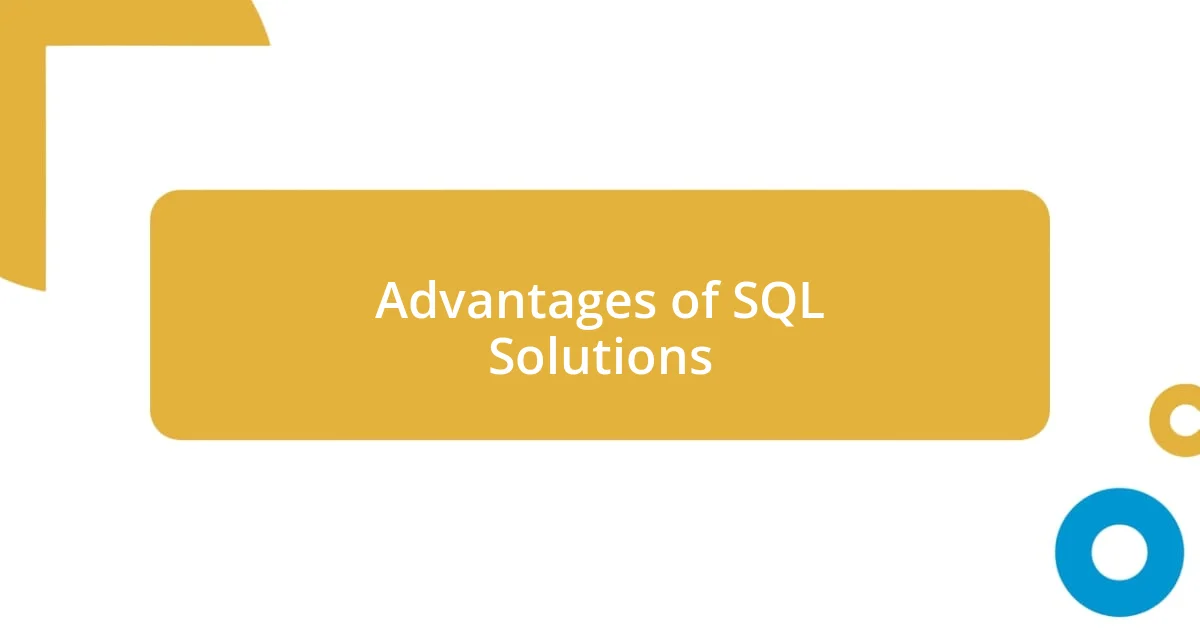
Advantages of SQL Solutions
SQL solutions offer several advantages that resonate with my own experiences in database management. For one, the power of structured data is something I deeply appreciate. I recall a project involving a healthcare application where we needed to ensure data precision and accessibility. Leveraging SQL allowed us to create well-defined schemas, making data easy to query and analyze. This clarity in structure not only simplified our work but also made me feel confident that I was providing accurate insights to healthcare professionals.
Another significant advantage lies in the robustness of SQL’s transaction support. I vividly remember working on a retail checkout system where the stakes were high—every sale needed to be tracked meticulously. SQL provided the ACID (Atomicity, Consistency, Isolation, Durability) properties we relied on, ensuring that our transactions were secure and reliable. Have you ever had a system fail when you needed it most? Using SQL meant that I could avoid such pitfalls, knowing our transactions were protected.
Finally, SQL databases excel in handling relationships between data. In a logistics project I took part in, the need to manage supplier, inventory, and shipment data efficiently was crucial. Thanks to SQL’s ability to perform complex joins, I could generate comprehensive reports quickly. I found it satisfying to connect disparate data points seamlessly, transforming them into actionable strategies for supply chain optimization. Isn’t it rewarding to see how a well-structured database can simplify even the most complicated of workflows?

Making the Right Choice
Choosing between NoSQL and SQL tools can often feel daunting, especially when you consider the long-term implications for your projects. I remember a crucial moment in my career when I was torn between the flexible nature of NoSQL and the structured reliability of SQL for a startup’s data needs. I found myself asking, “What kind of growth do we anticipate?” This question became my compass, guiding me toward a decision that would ultimately shape the scalability of the application we were building.
It’s also essential to consider the nature of your data and how it’s accessed. For instance, while working on a social media analytics tool, I faced a pivotal choice between a NoSQL store and a traditional SQL database. The shifting data landscape demanded rapid adjustments, leading me to appreciate the agility of NoSQL. I questioned whether our users would benefit from real-time insights, a thought that influenced my recommendation. I discovered firsthand that tuning into user requirements can help clarify the right tool for the job.
Lastly, don’t underestimate the emotional weight of your decision. I can recall a project where I underestimated the need for easy data manipulation and collaboration across teams. When we opted for a SQL solution, it initially felt smooth, but I soon realized how cumbersome it became as our project evolved. Have you ever felt trapped by a decision in a project? That experience taught me the importance of being flexible about my choice and the value of revisiting decisions as requirements evolve. Your choice should resonate not just with the current needs but also with your vision for future-proofing your data strategy.





